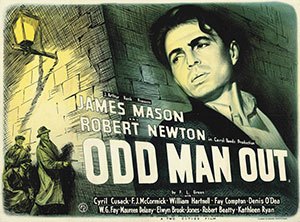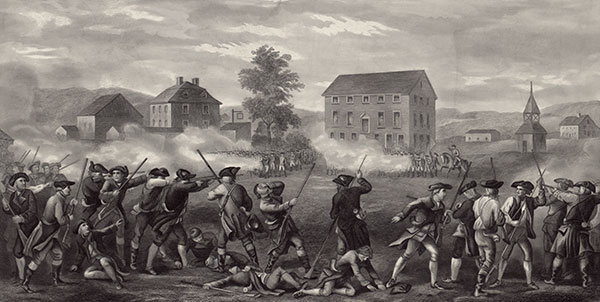On this Day
Published in Issue 2 (March/April 2018), News, On this Day listing, Volume 26BY AODHAN CREALEY
MARCH
03/1947
 Carol Reed’s film noir Odd Man Out, set in post-war Belfast with James Mason in the title role, opened in the city’s Classic cinema, off Royal Avenue. A large number of RUC men, in uniform and in plain clothes, were on duty outside, partly because Inspector General (Chief Constable) Sir Richard Pym was in the audience and partly because of the sensitive story-line, the tale of a badly wounded IRA gunman on the run after a botched robbery. Not that the RUC was formally identified in the film, nor indeed the IRA. The latter was identified only as ‘the Organisation’.
Carol Reed’s film noir Odd Man Out, set in post-war Belfast with James Mason in the title role, opened in the city’s Classic cinema, off Royal Avenue. A large number of RUC men, in uniform and in plain clothes, were on duty outside, partly because Inspector General (Chief Constable) Sir Richard Pym was in the audience and partly because of the sensitive story-line, the tale of a badly wounded IRA gunman on the run after a botched robbery. Not that the RUC was formally identified in the film, nor indeed the IRA. The latter was identified only as ‘the Organisation’.
Local audiences had mixed feelings about it. Some were unhappy with the liberties taken with the city’s topography. The Albert Clock, for instance, had been relocated. Most, however, complained about the lack of authentic Belfast accents amongst the cast. Mason, renowned for his mellow tones, failed to master the local intonations, while there was considerably more of the Liffey than the Lagan in the accents of the Abbey Theatre players who filled most of the supporting roles. All, however, had nothing but praise for the fifteen boys from a Falls Road industrial school who embellished the street scenes with their squabbling, fighting, kicking football and baiting the police. Odd Man Out was, of course, critically acclaimed. It received a Bafta award as best British film (1948) and Reed went on to direct another classic, The Third Man, a few years later. Its success provided a stepping-stone to Hollywood for James Mason, and the boys from St Patrick’s Industrial School were rewarded with a trip to Denham Studios in Buckinghamshire, where most of the indoor scenes were shot.
03/1918
The Treaty of Brest-Litovsk was signed between the new Bolshevik government of Soviet Russia and the Central Powers.
04/1918
Army cook Albert Gitchell and over 100 other soldiers at Camp Funston, Kansas, fell ill with what became known as ‘Spanish ’Flu’, a worldwide pandemic that infected c. 500 million by the end of 1920, at least 50 million of them fatally.
06/1918
John Redmond (62), leader of the Home Rule Party since 1900, died.
06/1988
Three members of an IRA active service unit were shot dead by the SAS in Gibraltar (see 16th).
10/1968
Donagh O’Malley (47), minister for education, collapsed and died in Sixmilebridge, Co. Clare, while campaigning in a by-election.
16/1968
US troops led by Lt. William Calley murdered c. 500 civilians, mostly women and children, in the village of My Lai, South Vietnam.
16/1988
Loyalist gunman Michael Stone opened fire and threw grenades at mourners attending the funeral of the Gibraltar Three. Three were killed, including IRA member Kevin Brady (see 19th).
18/1768
Laurence Sterne (54), Tipperary-born clergyman and author, notably of The life and opinions of Tristam Shandy, gentleman (1759) and A sentimental journey through France and Italy (1768), died.
19/1988
Two plain-clothes British soldiers were attacked by the crowd and later killed by members of the IRA during the funeral procession of IRA Volunteer Kevin Brady to Milltown Cemetery, Belfast.
21/1978
Cearbhall Ó Dálaigh (66), jurist and president of Ireland (1974–6), died.
22/1918
Captain W.A. Redmond (IPP), son of John Redmond, was defeated Dr V.J. White (Sinn Féin), by 1,242 votes to 745, in the Waterford City by-election.
24/1968
The Aer Lingus Viscount St Phelim plunged into the sea near Tuskar Rock, Co. Wexford, with the loss of 61 lives.
27/1968
Yuri Gagarin (34), Russian pilot and cosmonaut who was the first man in outer space (1961), died when his jet crashed during a training flight.
APRIL
19/1775
Skirmishes in Concord and Lexington marked the beginning of the American Revolutionary War. Irishmen fought on both sides of the conflict. Up to half of Washington’s Continental Army were Irish; ten of his generals were Irish-born and twenty others were of Irish parentage. The navy produced at least two Irish heroes. Jeremiah O’Brien (1740–1818) from County Cork, along with his four brothers, captured a British schooner in the first naval action of the war, whilst Commodore John Barry (1745–1803) from County Wexford, the first naval commander appointed by the Continental Congress, was the first to capture a British warship. Today he is remembered as ‘the father of the American Navy’.

Above: A 1903 engraving of the Battle of Lexington, 19 April 1775, by John H. Daniels & Sons.
On the British side there were two Irish regiments. Both the 105th Foot, also called ‘the Volunteers of Ireland’ and raised in Philadelphia by Ulsterman Lord Rowdon-Hastings, and ‘the Roman Catholic Volunteers’ were made up of Irish deserters from the Continental Army. In a war conducted by second-rate military leaders—Washington was not a great general but a great leader—many on the Revolutionary side were to make their mark in the politics of the emerging United States. Others, on the British side, were to grace the history of the third ‘revolution’ of the late eighteenth century—our own 1798 Rebellion. The British commander, Gen. Charles Cornwallis, went on to become lord lieutenant of Ireland (June 1798 to March 1803). And the youngest son of the duke of Leinster, whose service with the Crown ended when he was seriously wounded at the Battle of Eutaw Springs, South Carolina (1781), become one of the most romanticised figures on the rebel side—Lord Edward Fitzgerald.
01/1918
The Royal Air Force (RAF) was formed through the amalgamation of the Royal Flying Corps (RFC) and the Royal Naval Air Service.
03/1918
Thomas J.S. Harbinson (IPP) defeated Seán Milroy (Sinn Féin) by 1,802 votes to 1,222 in the Tyrone East by-election.
04/1968
Martin Luther King (39), American Civil Rights leader, was assassinated by James Earl Ray in Memphis, Tennessee.
07/1868
Thomas D’Arcy McGee (42), Young Irelander, writer, politician and one of the fathers of the Canadian Confederation (1867), was assassinated in Ottawa by a Fenian sympathiser, Patrick J. Whelan.
09/1918
Prime Minister Lloyd George introduced the Military Service Bill to apply conscription to Ireland.
10/1998
The Good Friday/Belfast Agreement on the future governance of Northern Ireland was signed by the British and Irish governments and the North’s main political parties, with the exception of the DUP.
11/1968
President L.B. Johnston signed the historic Civil Rights Act, also known as the Fair Housing Act, into law.
18/1918
The Mansion House conference, called by the lord mayor of Dublin, Laurence O’Neill, on the day the Military Service Bill became law, was attended by all shades of nationalist opinion. An anti-conscription pledge, drafted by Éamon de Valera, was issued.
20/1968
In what became known as the ‘rivers of blood’ speech, Enoch Powell MP strongly criticised mass immigration, especially Commonwealth immigration to the UK, and the then proposed Race Relations Act.
21/1918
Manfred von Richthofen, the notorious German flying ace known as the ‘Red Baron’, who had 80 victories under his belt, was killed by Allied fire in northern France.
23/1918
A general strike against conscription, organised by the Labour movement and supported by Sinn Féin, the IPP and the Catholic hierarchy, paralysed the country.
27/1967
The Abortion Act, making abortion legal up to 28 weeks’ gestation, came into effect in the UK, with the exception of Northern Ireland.
















